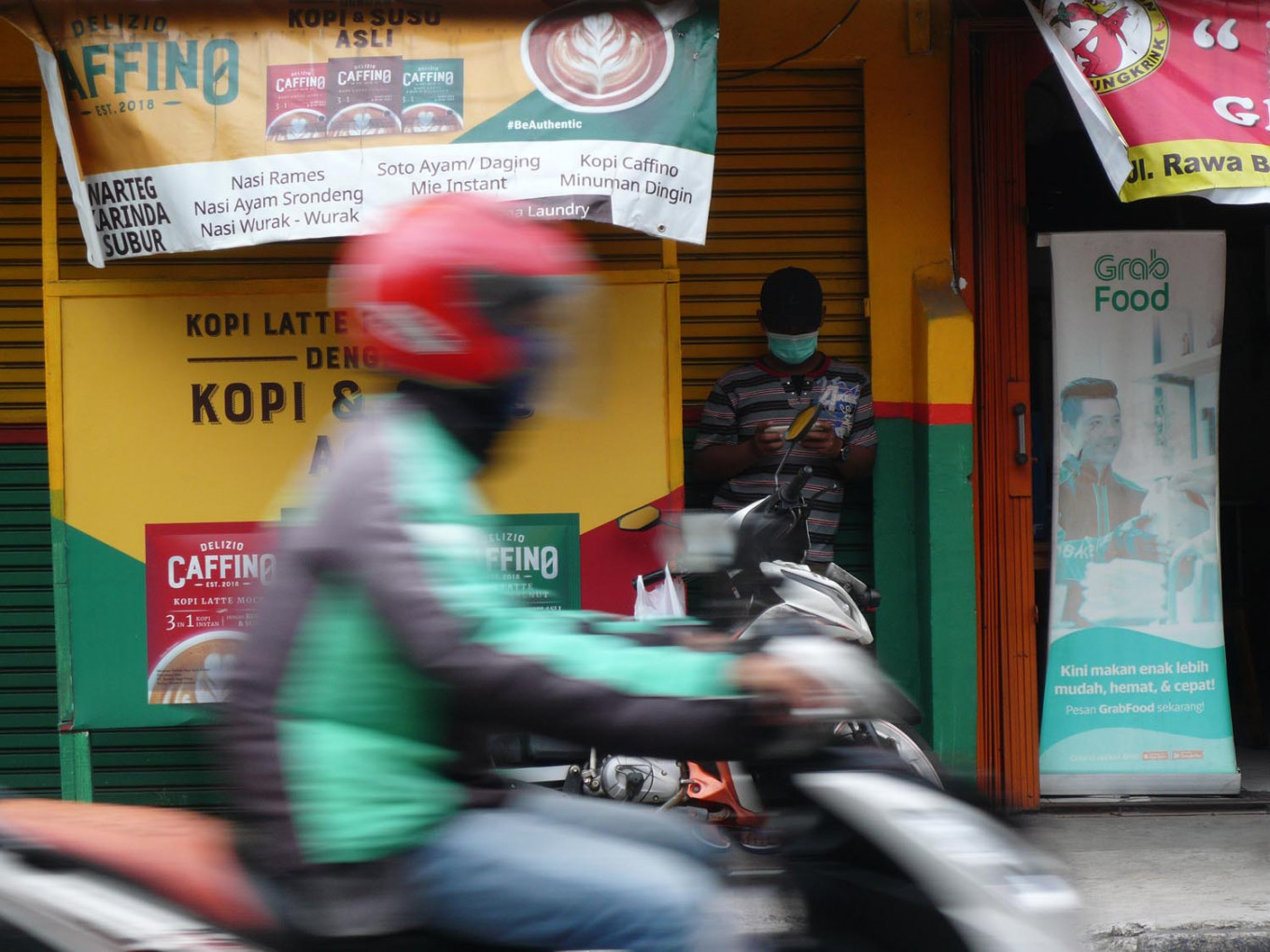Popular Reads
Top Results
Can't find what you're looking for?
View all search resultsPopular Reads
Top Results
Can't find what you're looking for?
View all search resultsGig economy supports Indonesia's economic resilience
Being digital-ready is more important than ever in the new normal.
Change text size
Gift Premium Articles
to Anyone
T
he COVID-19 pandemic has disrupted almost all businesses, transformed consumer habits and the world of work in Indonesia. Only digitally savvy businesses and workers survive or even prosper during the pandemic.
Brick and mortar businesses suffer most, as more and more consumers move online. Through online platforms, digitally connected consumers order food, buy groceries, consult with doctors, learn high school physics and book housekeeping. Individuals with various levels of skill and businesses at various levels of scale see opportunities to connect directly with consumers via digital platforms, giving rise to the gig economy.
The rising gig economy creates employments for millions of people and leads to their increased contribution to the Indonesian economy. More than that, the gig economy support Indonesia’s economic resilience during the pandemic by continuously offering employment and business opportunities, including for those losing jobs in the formal sector.
A 2019 study by the Centre for Strategic and International Studies (CSIS) and Tenggara Strategics on 5,008 Grab partners — selected through a systematic random sampling method — shows their expanding economic contributions. The partners surveyed across 12 big cities reported that Grab not only provides better economic opportunities for informal workers — who account for 56.5 percent of Indonesia’s labor force — but also stimulates small business growth and job creation outside of the Grab platform.
GrabBike and GrabCar driver-partners, GrabFood merchant-partners and GrabKios agent-partners — with the help of the Grab platform — contributed Rp 77.4 trillion (US$5.3 billion) to the Indonesian economy in 2019, up 58.3 percent from Rp 48.9 trillion in 2018. The number is their direct contribution and does not include the multiplier effects of their work and businesses.
That the gig work through the Grab platform contributed big to the economy last year is no surprise. First of all, partners across all the four lines of business reported increasing sales and income after joining Grab. GrabFood merchant partners, for example, reported a 35 percent increase in sales after joining Grab, while GrabBike and GrabCar driver partners reported 124 percent and 107 percent increases in their income respectively. Their income level was way above the minimum wages in their respective cities in 2019.
Next, the number of partners is increasing every year, and last year saw the highest growth in food merchants. The Grab platform, which offers a vast customer base and a wide fleet of delivery partners, has enticed people to start food businesses. Some 12 percent of GrabFood merchant-partners said they considered starting their businesses because of GrabFood, while 16 percent said they had joined the GrabFood platform from the first day they opened their food businesses.
Lastly, the Grab platform introduces a mutually reinforcing ecosystem where GrabFood merchant partners and GrabBike driver partners are interconnected with each other, so they can do business together to meet consumer demand. As GrabFood merchant partners’ businesses grew, GrabBike driver-partners saw increased earning opportunities from higher demand for food delivery. On average, 37 percent of their trips in 2019 were orders for GrabFood delivery.
Such a mutually reinforcing ecosystem proves advantageous during the pandemic, especially for GrabBike driver partners who faced a drastic drop in demand for transportation services. When major cities imposed large-scale social restrictions (PSBB), GrabBike driver partners could continue working by delivering food for GrabFood customers.
A follow-up survey by CSIS-Tenggara Strategics on 450 GrabFood, GrabBike and GrabCar partners in Greater Jakarta in June 2020 shows that GrabBike driver-partners are likely to diversify their income sources after the pandemic, with 48 percent saying they will rely on food delivery services, 32 percent on package delivery services and only 20 percent on transportation services.
The follow-up survey also found that almost all GrabBike (98 percent), GrabCar (98 percent) and GrabFood (100 percent) partners said they would continue to rely on Grab to earn a living post COVID-19. This indicates that partnering with Grab provides the income stability gig economy workers and businesses desire. Their services will be needed now more than ever as people will likely have to adjust to a “new normal” — where telework, virtual learning and social distancing will be more common than before, creating increased reliance on digital services and deliveries.
The findings of the CSIS-Tenggara Strategics studies, both the survey conducted before the COVID-19 pandemic and the followup survey held at the height of the pandemic, suggest that the gig economy, powered by digital platforms like Grab, will have a more important role to play in supporting the economic recovery. Being digital-ready is more important than ever in the new normal.
***
The executive director of Tenggara Strategics, a research and business intelligence institute founded by CSIS, The Jakarta Post and Prasetiya Mulya University










